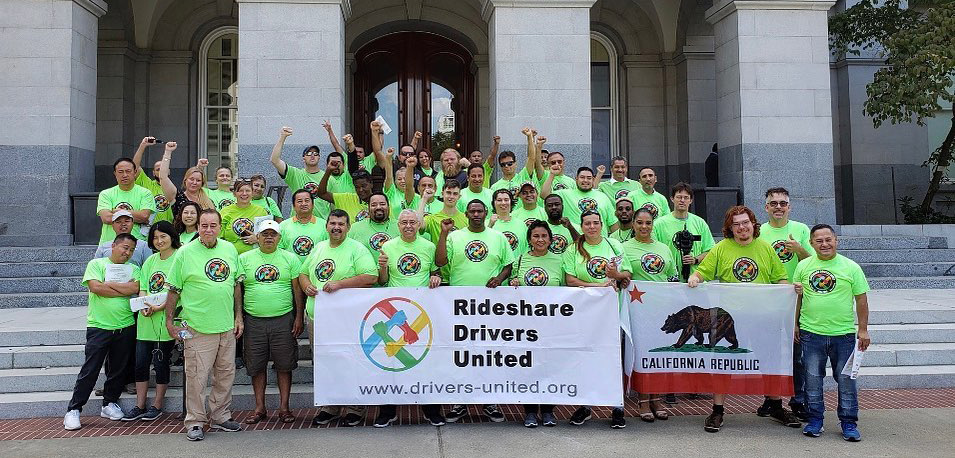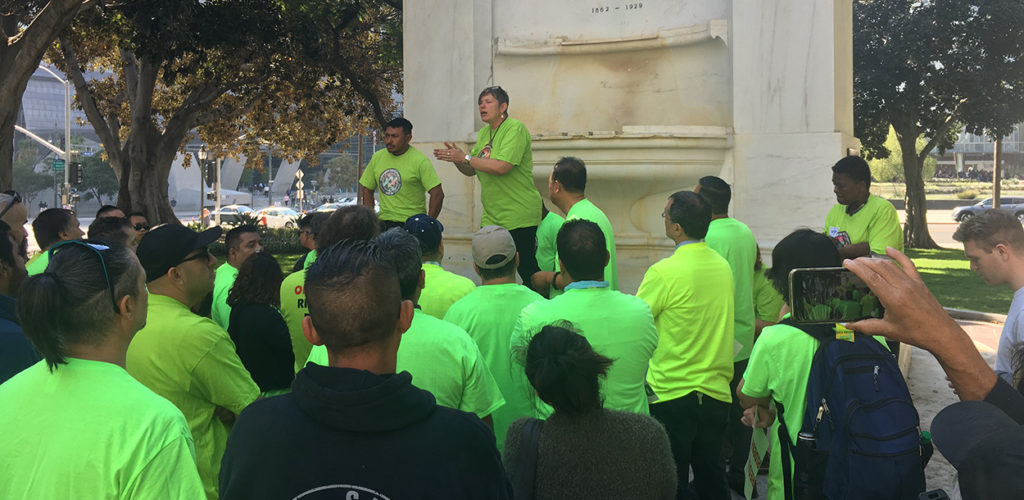The state of California recently passed legislation that aims to radically reshape the gig economy. Assembly Bill 5 (AB5) — signed into law by Governor Gavin Newsom on September 19 — limits the use of classifying workers as independent contractors instead of employees. The law entitles workers at companies like Lyft and Uber, for example, to certain labor protections that do not currently apply to them, such as sick leave, unemployment, worker’s compensation, and a minimum wage.
One of the groups instrumental in the fight for AB5 was Rideshare Drivers United, an organization based out of Los Angeles, comprised of over 5,000 drivers from Uber, Lyft and other ride-hailing platforms. We spoke with Nicole Moore, one of several drivers who is part of the Rideshare Drivers United Organizing Committee, about the grassroots movement that put AB5 on the legislative agenda.
Robert Raymond: Can you tell us a little bit about the current challenges in the ride-hailing industry, and what Rideshare Drivers United is doing to address them?
Nicole Moore: To understand what Rideshare Drivers United does, we have to understand what’s happening right now in this industry. We have these companies who claim innovation but who have really just taken an industry and figured out how to make it extremely profitable for a few and to basically destroy the profession of driving on the other end. They’re companies that drop their app into a community — regardless of regulatory or other issues — and really just go in and then ask for forgiveness or try to work things out later. That’s been their model in municipalities across the world, and it’s why this kind of work is one of the fastest growing poverty jobs in America.
Rideshare Drivers United is an organization of drivers that are fighting for what drivers need to make driving a sustainable and respectable profession. We began organizing a little over a year ago and started building the organization with more and more drivers. One of the things that we did — and that we’re still committed to doing — is actually asking the drivers themselves: What are your priorities? What are the things you want to fight for? So we’re driver-lead. We have a strong commitment to democracy and to giving drivers a voice in how to move our fight forward.
Can you talk a little bit about the organization’s demands and your Drivers’ Bill of Rights?
The Drivers’ Bill of Rights is a document that is based exactly on what the drivers who are part of our organization have democratically voted for and decided to prioritize. The first part of the bill is demanding fair pay for it for what we do. Fair pay is having a minimum wage and having our pay linked to what passengers pay, with a 10 or 15 percent commission as the limit for what the companies can take. Right now the companies are scraping more and more [off] the fare, to the point that they’re taking more than 50 percent of the [money from] fares into their own coffers.
Transparency is another issue — there’s so little transparency going on in everything the companies do. Drivers actually have no idea what percentage [of the fares] the company is taking, for example. Another example is that on March 11th of this year, Uber drivers woke up to a 25 percent pay cut on mileage rate — they went from 80 cents to 60 cents.They just woke up and the cut had happened. Drivers also get deactivated for no reason. So transparency is a very important issue.
Another part of the Bill of Rights is giving drivers a voice on the job. Right now, we’re misclassified as independent contractors, and we don’t have the right to form a union or to be able to bargain for a legally defensible contract. We don’t have any say in what happens in the future.
The fourth and final part is community standards. Lyft and Uber have been very bad players in that they don’t want to share data with municipalities; they don’t want to follow the rules that municipalities have. And they act as these rogue players in municipalities, which leads to piling on car after car after car in our cities, which is bad for the community in terms of congestion, in terms of carbon emissions, and also bad for drivers. It might be good for a passenger to get picked up in just one minute. But [it would be better to] have it be a five minute pickup window and guess what? You have less congestion and drivers are actually able to make a living. I mean, right now, the occupancy rate of our cars — like how much in a shift of work are we actually having a passenger in the back — is way under 50 percent.
California recently passed a law that aims to reshape the gig economy. Can you explain what role Rideshare Drivers United had in raising awareness around drivers’ rights and ultimately getting AB5 on the legislative agenda?
We put this issue on the map back in March, when Uber cut our pay 25 percent and Lyft was about to go public. We decided it was a critical time for us to express exactly what was going on for drivers — and so we went on strike. At our rally and press conference, people told their personal stories of what these pay cuts mean, what driving means, how people had lost their homes in the process of being drivers, the amount of investment people had made in these companies, and how little money people are actually making.
We started to talk with lots of other driver groups in the state and across the country who were also organizing, and folks said next time you strike, we’re going with you. Then on May 8th, we decided to go on strike again. It was a hard decision to make — it’s not easy to go on strike. But we organized an incredible strike not just here in LA, but across the state and across the country. Two days later, Uber’s IPO [launched] and it tanked. We had changed the conversation. This was a movement of hundreds of thousands of workers across the world, and I’m just very, very proud to have been part of that moment.
I really think that that’s when the obligation of lawmakers to actually do something became really crystal clear. When the California Supreme Court decision on Dynamex passed, limiting when companies can classify workers as independent contractors instead of employees, Assemblywoman Lorena Gonzales immediately started drafting legislation to codify that decision — to clarify what Dynamex meant — and that legislation was AB5.
But let me be clear: I think our strikes were essential to changing public opinion about what’s really going on with these companies, and that adds to the pressure that all lawmakers and policy makers feel when they look at a law like this. The fact that drivers said “we deserve employee rights” and continue to organize and take action on those issues is why AB5 was able to actually pass.
Aside from the strikes, what other actions did Rideshare Drivers United help to coordinate to get AB5 passed? And what other groups were a part of the struggle?
We took several buses up to Sacramento and did our own lobbying. We had support from some of our friends in labor, we had a whole list of who all the senators were, who all the assembly people were, and we broke up into groups of five or six drivers and we took to Sacramento and talked to people about what was really going on for drivers and how essential this bill was.
The bill couldn’t have passed without the help of many different people. That includes the principled unions that backed AB5 from the very beginning. So we worked closely with the state building trades, we worked closely with Transport Workers Union and other unions who felt very strongly about this bill and how important it is not just to drivers, but to all workers. I was even on phone calls with nail salon operators for whom this bill is important. We we worked with everybody to move this bill forward because we’re not the only workers in America who are misclassified, but we are certainly one of the largest groups with probably more than 300,000 drivers in California. And so, our lawmakers really did the right thing. And our governor did the right thing as well — he signed the bill.

What are some of the upcoming fights or challenges that you see on the horizon?
In terms of AB5, the industry has already doubled down. First off, they’ve said they’re not going to pay any attention to it, that they’re not going to change anybody’s status. And secondly, they’ve put together a war chest of $90 million to put an initiative on the ballot to overturn AB5 for drivers. So enforcement strategies are really going to be a key part of this moving forward.
And what’s great about AB5 is that they built into the law ways to enforce it, so the state will actually have to enforce it. But also, any city in the state with over 750,000 people also has the right to enforce the law. So in those big cities, like Los Angeles and San Francisco, we’re already starting to work with the municipalities to figure out ways to enforce the law.
But we do still have a big fight in front of us. We have these intransigent companies who try to operate outside of the law, and all of us together have to fight to make it AB5 a reality. So I think our policy makers and our lawmakers have a moral obligation to lean in and help on this, and I’m seeing a lot of really good stuff happen already.
##
For more information visit Rideshare Drivers United
This interview was edited for length and clarity.









